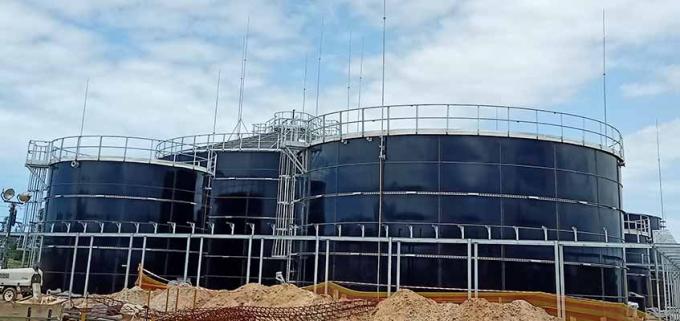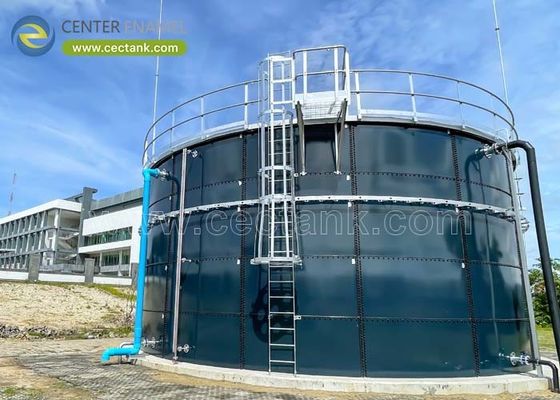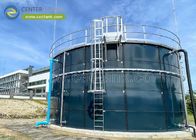-
Glass Fused Steel Tanks (248)
-
Stainless Steel Bolted Tanks (148)
-
Fusion Bonded Epoxy Tanks (68)
-
Galvanized Steel Tanks (44)
-
Aluminum Dome Roofs (82)
-
Waste Water Storage Tanks (218)
-
Anaerobic Digester Tank (203)
-
Industrial Water Tanks (178)
-
Glass Lined Water Storage Tanks (181)
-
Bolted Steel Tanks (167)
-
Sludge Storage Tank (118)
-
Biogas Storage Tank (163)
-
Liquid Storage Tanks (173)
-
Leachate Storage Tanks (140)
-
Agricultural Water Storage Tanks (175)
-
Fire Water Tank (168)
-
Grain Storage Silos (119)
-
Biogas Plant Project (43)
-
Wastewater Treatment Projects (98)
0.25mm Coating Thickness Glass Fused Steel Tanks Storage Silos
| Place of Origin: | China |
| Brand Name: | CEC TANKS |
| Certification: | ISO 9001:2008, AWWA D103 , OSHA , BSCI |
| Model Number: | J2016012311 |
| Minimum Order Quantity: | 1set |
| Price: | $5000~$20000 one set |
| Packaging Details: | PE poly-foam between each two steel plates ; wooden pallet and wooden box |
| Delivery Time: | 0-60 days after deposit received |
| Payment Terms: | L/C, T/T |
| Supply Ability: | 60 sets per month |
|
Detail Information |
|||
| Place of Origin | China | Brand Name | CEC TANKS |
|---|---|---|---|
| Certification | ISO 9001:2008, AWWA D103 , OSHA , BSCI | Model Number | J2016012311 |
| PH Range: | A Grade Sheet PH:3-11, AA Grade Sheet PH : 1-14 | Coating Thickness: | 0.25mm - 0.4mm, Two Coating Internal And External |
| Corrosion Resistance: | Excellent ! Suitable For Waste Water Salt Water, Sea Water, High Sulfur Crude Oil, Salt Fox, Organic And Inorganic Compounds | Adhesion: | 3,450N/cm |
| Permeability: | Gas And Liquid Impermeable | Acid And Alkalinity Proof: | Standard Coating Suits For PH3 - PH11, Special Coating Suits For PH1 - PH14 |
| Elastic: | Same As Steel Sheet , Around 500KN/mm | Serive Life: | More Than 30 Years |
| High Light: | 0.25mm Coating Glass Fused Steel Tanks,Glass Fused Steel Tanks Storage Silos |
||
Product Description
Advantages Of Storage Silos
A silo is a storage facility designed for the storage of a large quantity of items, particularly bulk materials. It typically features a cylindrical structure, providing an effective solution for the storage, preservation, and management of various items. Silos are primarily designed for the storage of bulk materials such as grains, cereals, ores, chemical raw materials, cement, plastic granules, and more. The design ensures that items can maintain a certain level of quality and safety during the storage process. While initially designed for agriculture and grain storage, silos have found widespread applications in various fields, including industrial, pharmaceutical, chemical, and food processing, thanks to technological advancements.

Structure and Characteristics of Silos
Cylindrical Shape: The basic structure of a silo is cylindrical, aiding in the even distribution of the weight of stored materials and enhancing structural stability. The cylindrical shape also facilitates efficient use of space.
Wall Materials: Silo walls are typically constructed from sturdy materials such as metal (e.g., steel, aluminum) or concrete to ensure effective protection of stored materials. These materials resist external environmental impacts while maintaining the structural strength of the silo.
Inlet and Outlet Ports: Silos usually have inlet and outlet ports for convenient loading and unloading of materials. The design of these ports minimizes material flow resistance, enhancing process efficiency.
Moisture and Insect Prevention Design: To preserve the quality of stored materials, silos are often equipped with moisture and insect prevention features. Well-sealed structures effectively prevent moisture and pests, reducing the risk of material contamination.
In summary, as a specially designed storage facility, silos play a crucial role in various industries due to their robust structure, efficient space utilization, and versatility. Their design and characteristics make them an ideal choice for large-scale storage.
Advantages of Storage Silos
Storage silos, as modern storage solutions, find widespread applications across various industries. Their advantages are mainly evident in the following aspects:
Safety and Stability:
Sturdy Structure: Silos are typically constructed with robust materials such as metal (e.g., steel), ensuring high structural stability to withstand significant material loads.
Fire and Explosion Resistance: The structural design of silos considers fire and explosion requirements, reducing the risks of fires and explosions and enhancing the safety of stored materials.
Space Utilization:
Cylindrical Design: Silos, adopting a cylindrical shape, effectively utilize storage space, maximizing warehouse capacity.
Storage Height: The design of vertical silos allows for greater storage heights, further optimizing space utilization efficiency.
Quality Preservation and Freshness:
Moisture Prevention Design: Silos often feature moisture prevention designs to effectively prevent humidity, maintaining the quality of stored materials.
Sealing: Silos have excellent sealing, preventing the entry of air, dust, and pests, thus preserving the cleanliness and freshness of materials.
Convenient Loading and Unloading:
Outlet Design: Silos are typically equipped with outlets, facilitating the loading and unloading processes. This design streamlines material handling and improves logistics efficiency.
Automation Technology: Some silos incorporate advanced automation technologies such as conveyor belts and unloading devices, further simplifying loading and unloading processes.
Versatility and Flexibility:
Silo Combination: Multiple silo structures can be combined to form an integrated storage system, enhancing flexibility to meet diverse storage needs for different materials.
Suitable for Various Materials: Due to the flexible design, silos can accommodate various materials, including grains, chemical raw materials, ores, etc., making them widely applicable across different industries.
Technological Innovation:
Automation Control: Some advanced storage silos are equipped with automation control systems, enabling remote monitoring and intelligent management. This enhances storage management efficiency and accuracy.
In conclusion, storage silos, with their safety, efficiency, multi-functionality, and adaptability, have become an indispensable part of modern storage systems. Their design and performance advantages allow them to play a key role in various industries globally.
Development History of Silos
Origin: The history of silos as structures for storing and preserving large quantities of items can be traced back to ancient times. The earliest silos appeared in agricultural societies and were used for storing grains and agricultural products. Ancient civilizations such as Egypt, Greece, and Rome recorded the use of structures similar to silos for storage purposes.
Development Process: With the progress of society, silos gradually evolved into more complex and diversified structures during the medieval period. During the Industrial Revolution, as production methods and trade underwent transformation, the design and construction of silos experienced revolutionary changes. The application of new materials such as metal and concrete made silos more durable.
Modernization: Since the 20th century, with technological advancements, the design and management of silos entered a modernized stage. The application of automation technology, computer control systems, and other advanced technologies enabled silos to play an increasingly important role in storage and logistics.
Global Proliferation: Silos have become widely prevalent globally and are an integral part of modern storage systems. They are not only adopted in developed countries but are also widely used in developing countries, providing storage solutions for various industries, including grain, chemicals, pharmaceuticals, and more.
Application Fields
Currently, silos find applications in multiple industries, including but not limited to:
Agriculture: Used for the storage of grains, cereals, and agricultural products to ensure food security.
Industrial: Utilized for storing industrial materials such as chemical raw materials, minerals, petroleum, and natural gas.
Pharmaceutical: Employed for storing raw materials and finished pharmaceutical products, ensuring the quality of medicines.
Food and Beverage: Used for storing food, beverages, and other processed products, ensuring food safety.
Application of Advanced Technologies: Modern silos not only boast more robust structures but also integrate advanced technologies. The application of automation control, smart monitoring systems, and big data analysis technologies enhances the efficiency and safety of silo management, making them more adaptable to modern logistics requirements.
In summary, through a long history of development, from simple structures in the beginning to modern multifunctional storage systems, silos have become an indispensable part of the global warehousing industry. Their widespread application in different fields and the introduction of modern technology make silos play a crucial role globally.




